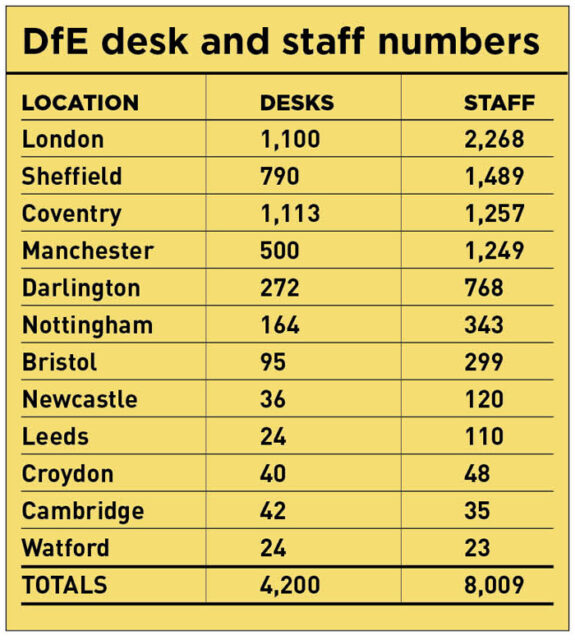Staff at the Department for Education have had to work in corridors and canteens after the government’s return-to-the-office edict because the DfE has almost twice as many workers as desks.
Whole teams have been turned away from some offices because of over-crowding. And rural staff and those with caring responsibilities are considering their futures as even pre-pandemic flexibility is “deemed unacceptable”.
Staff outnumber desks by almost two-to-one across the DfE’s 12 offices, figures seen by Schools Week show. In Leeds, there are just 24 desks for 110 staff. Bristol has 95 desks for 299 staff.
But bosses have decreed that staff should work at least 80 per cent of their week in the office.

The PCS civil service union has written to the education secretary Nadhim Zahawi after accusing ministers of an “unprofessional and unfair political attack on our members”.
The FDA union, representing senior officials, said it had been “inundated with concerns”.
Efficiency minister Jacob Rees-Mogg has called for offices to return to “full capacity”. He even visited some departments to leave Post-It notes for absent employees.
Zahawi announced in April that he had instructed his team to “go back immediately to pre-covid working and offices”. Leaked figures had shown that just 25 per cent of DfE staff were going in, the lowest level in Whitehall.
Following the intervention, DfE staff were summoned to a virtual meeting. Permanent secretary Susan Acland-Hood, flanked by ministers, told staff to work 80 per cent of their week in the office, Schools Week understands.
4,200 desks for 8,000 DfE staff
However, even before the pandemic, the DfE only had an occupancy rate of 60 to 70 per cent. This was in part down to the department’s support for flexible working. The DfE’s occupancy rate is now “similar” to those levels, ministers confirmed this week.
But changes to the department’s estate, including giving up space in the DfE’s London headquarters for other government bodies, mean there are fewer desks to go around.
Data released this week in response to a Parliamentary written question shows the DfE now has 4,200 desks across its 12 offices, but 8,009 full-time-equivalent staff. In London and Manchester, there are more than double the number of staff than desks.

PCS general secretary Mark Serwotka said Rees-Mogg’s “Post-It note stunt has been exposed for what it is – an unprofessional and unfair political attack on our members”.
“To try to shame them back into the office when they have been working hard and successfully at home throughout the pandemic is bad enough.
“But, when there aren’t enough desks – when it’s not physically possible – looks like the action of a bully.”
He urged ministers to think about how their actions will “affect the recruitment and retention of civil servants” and added: “Our members have worked flexibly for many years and deserve to be treated with respect, not like naughty schoolchildren.”
Shadow schools ministers Stephen Morgan said the government’s “bizarre fixation on office attendance is utterly laughable given that the DfE has just half the desk space it needs for all its staff”.
“Instead of acting as glorified hall monitors, ministers should be spending their time tackling the day-to-day challenges children and teachers are facing.”
Teams sent home after mass return
Schools Week understands that staff were sent home from the DfE’s Sheffield office after a mass return earlier this month, despite some already using communal spaces like the canteen.
Zoom meetings were also run with staff perched on the end of shared seating because meeting rooms were full.
The government is in the process of moving thousands of civil service jobs out of London.
The FDA said it had been “inundated with concerns from members over the impact of the edict to return to offices”.
We are also aware of members whose pre-pandemic flexible working arrangements are now deemed unacceptable
National officer Helen Kenny told Schools Week the move was “unwarranted and shows no awareness of the impact on individuals”.
“We are also aware of members whose pre-pandemic flexible working arrangements are now deemed unacceptable, which is impacting working parents and those with caring responsibilities in particular.”
The DfE said hybrid working was “not new and does not stop offices being used at full capacity”. Such arrangements were in place before the pandemic.
Full occupancy also “does not mean every civil servant working from their desk”, the DfE said. It said it was “common for organisations in the private and public sector not to have space for all their employees”.
















Sensational that the Susan Acland-Hood was daft enough not to see this coming. Did she not know her staffing situation in the department? Did she not understand it? Did she not care? This can’t all be blamed on Rees-Mogg; he’s not expected to know the details of staffing in every department.
She had two jobs; protect her staff and push back against unrealistic or unimplementable policies. She has totally failed both of them. Time for someone to join the 91,000?
Ridiculous!